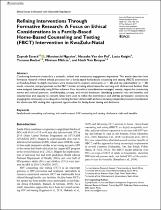Refining interventions through formative research: a focus on ethical considerations in a family-based home-based counselling and testing (fbct) intervention in KwaZulu-Natal
Abstract
Conducting formative research is a scientific, ethical, and community engagement imperative. This article describes how formative research refined ethical processes for a family-based home-based counseling and testing (FBCT) intervention in KwaZulu-Natal. In-depth interviews were conducted to explore community (n = 20) and key stakeholders’ (n = 20) needs, concerns, and perspectives on the FBCT model, including ethical issues for working with children and families. Data were analyzed thematically using NVivo software. Four key ethical considerations emerged, namely, respect for community norms and cultural practices; confidentiality, privacy, and forced disclosure; identifying potential risks and benefits; and voluntariness and capacity to consent. Data were used to refine the intervention and address participants’ concerns by engaging the community, providing ethics training for intervention staff, and incorporating independent consent mechanisms for adolescent HIV testing that supported opportunities for family-based testing and disclosure.

